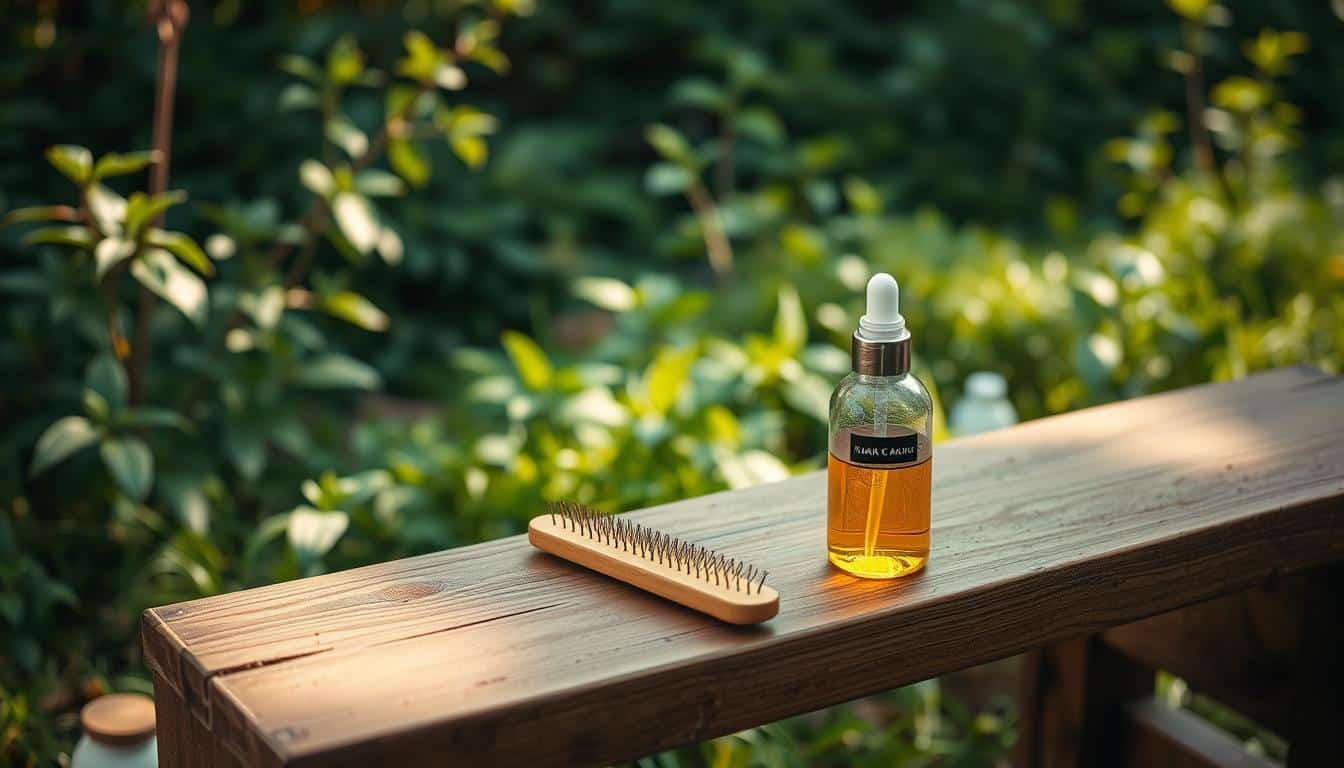Keeping clean while camping is tough, especially for hair. Having little water makes normal washing hard. But, using no-wash camping hair tricks can keep you feeling fresh. This article looks at handy tips like dry shampoo and small hair products. You’ll find out how to handle camping hygiene easily and keep your hair looking good.
Understanding the Challenges of Camping Hygiene
Camping hygiene comes with its own set of challenges. There’s often no access to running water or clean facilities. This makes staying clean outdoors tough, especially with heat, dirt, and the elements.
Still, camping can be fun with some prep work. Basic hygiene tips can make you feel fresh. Packing essentials like wet wipes and hand sanitizers helps a lot. Knowing how to stay clean makes camping much more enjoyable.
Preparing Your Hair Before the Trip
Getting ready for your camping trip means taking care of your hair and skin. Prepping your hair in different ways ensures you’re all set for the outdoors. By exfoliating and washing your hair well, you lay the groundwork for a great time outside.
Exfoliation and Full-Body Wash
It’s essential to thoroughly wash your body and exfoliate your hair. Use a good exfoliating scrub to get rid of dead skin. This makes your skin brighter and smoother. It also makes moisturizers work better, keeping your skin moist while camping.
Exfoliating regularly helps prevent breakouts, especially in blemish-prone areas. Making exfoliation a part of your prep enhances your comfort significantly.
Double Shampoo for Longer Freshness
Using the double shampooing method is a great tip. Washing your hair twice in one go gets rid of oil, dirt, and leftover product. This is especially good for those who get sweaty and dirty from being active. Your hair stays clean longer, reducing the need to wash it while camping.
But remember, if your hair is dry or treated, double shampooing might not be the best for you.
Why Showers Aren’t Always Necessary
When camping, a traditional shower may not be an option. Still, staying clean is possible. Body wipes have become a popular choice for campers. They provide a quick and convenient way to freshen up without water.
Using Body Wipes for Easy Cleanliness
Body wipes are great for outdoor adventures. They come in eco-friendly and scent-free varieties, perfect for nature lovers. They reduce odors and clean the skin with a simple wipe.
Alternatives to Traditional Showers
Seeking alternatives to showers can make camping more fun. Natural water bodies can offer a refreshing cleanse. Just remember to pick clean, safe places to swim. Using body wipes and swimming in nature can keep you clean and refreshed.
Stay Fresh with No-Wash Camping Hair Solutions
A camping trip lets you break free from everyday life. Yet, keeping your hair clean without regular washes can be tough. Dry shampoo offers an answer, letting campers maintain fresh hair easily. These products absorb oil fast, revitalizing your hair in moments—perfect for those who love the outdoors.
Utilizing Dry Shampoo Effectively
For the best results, put dry shampoo right on your roots. This tackles the oil and grime, making your scalp feel new again and your hair look fuller. Try products like Amika’s Perk Up Ultra Oil Control Dry Shampoo, made especially for oily hair, with ingredients like tapioca starch and bamboo extract. They ensure your hair stays fresh and clean, leaving you free to enjoy your adventure.
Sample Sizes for Travel
Packing light is key when camping, and travel-sized hair products help a lot. These small items reduce packing stress and keep your hair care routine intact. Options like Kevin Murphy’s YOUNG.AGAIN DRY CONDITIONER and Amika’s Silken Up Dry Conditioner are perfect sizes for travel. They’re easy to carry and prevent leaks, making them great for any trip.
Creating a Simple Hair Routine While Camping
Having a good camping hair routine is key to keeping your hair clean outdoors. Using body wipes for daily cleaning and moisturizing helps a lot. These wipes are great for outdoor hair care because they keep your hair fresh without water.
Dry shampoo is also a smart choice for simple hair care. It soaks up extra oil and makes your hair feel refreshed quickly. Also, try to touch your hair less at night to avoid tangles. Putting your hair in a braid or a loose ponytail helps keep it clean and less tangled.
This easy routine helps you enjoy your outdoor activities. You can have fun outside, knowing your hair looks good and feels clean.
Embracing Natural Styles on Your Camping Trip
Camping trips are perfect for trying out natural hair styles. This lets you enjoy nature without worrying about your hair. Choosing low-maintenance styles saves time and keeps your hair healthy on your trip.
Wearing Braids to Manage Hair
Braids are a smart choice for camping. They stop your hair from tangling and getting damaged. Braids also protect your hair from dirt.
They make it easier to manage your hair, giving you more time to have fun outdoors. You can keep them in for days, which helps your hair stay clean and healthy.
Utilizing Hats and Bandanas
Using hats and bandanas is smart when camping. They protect your head and hair from the sun. They also cover up hair that might not be clean, keeping you looking good.
Choosing items made of light, sweat-wicking materials makes them more comfortable to wear, especially when you’re active.

Maintaining Your Hair’s Condition in the Wilderness
When you’re out enjoying nature, it’s easy to forget about hair care. The sun, wind, and not washing your hair can hurt it. It’s important to take steps to keep your hair healthy while camping. Protecting your hair from the sun is crucial to avoid dryness and damage.
Importance of Sun Protection
Being in the sun a lot can harm your hair. Use sprays made to protect hair from UV rays. Wearing a hat also helps by cutting down on sun exposure. Using both can keep your hair healthy on your camping trips.
Using Leave-In Conditioners on the Go
Leave-in conditioners are great for keeping your hair hydrated and manageable while camping. They moisturize and protect your hair from the environment. Using a leave-in conditioner every day can make your hair softer and shinier. Choose ones that are light so they don’t make your hair heavy during activities.
Keeping Hair Accessories Handy
Packing the right hair items is crucial for camping. Essential accessories help manage your hair easily outdoors. Choose portable hair tools that are simple to use, keeping you ready for anything.
Travel-Friendly Hair Tools
When heading into the wild, select the right travel hair items. You should pack:
- Hair ties and clips for easy styles
- Portable combs or brushes
- Headbands to keep your face clear
These options make managing your hair easy. So, you can enjoy your adventure with less hassle.
Incorporating Multi-purpose Products
Using multi-purpose hair products while camping saves space. Look for products that style and protect. For example:
- Leave-in conditioners that also detangle
- Sprays offering hold and moisture
- Serums that guard against sun damage
This approach reduces what you carry but still takes good care of your hair. It’s smart packing for any camping trip.
Dressing Smart for Camping Hygiene
Picking the right clothes is key to staying clean while camping. Choose light, moisture-wicking materials to manage sweat and stay comfy. These fabrics help you stay dry and avoid the rashes and irritation sweat can cause.
Tips on what to wear camping can make a big difference. Wear new clothes each day to keep odor and dirt at bay. Have a spot for dirty laundry to keep your things tidy. It’s important to keep clean clothes apart from dirty ones for good hygiene.
It’s important to pack enough underwear for any weather. Also, bring clothes that will keep you clean and comfy in all conditions. This way, you’ll stay clean and enjoy the outdoors more.
Caring for Overall Hygiene While Camping
Keeping clean while camping is key for a good time. This means not just caring for your hair, but all of yourself. Simple tips can really help keep you clean on your trip.
Wipes for Quick Freshening Up
Body wipes are a quick way to clean up. They’re easy to carry and help you feel clean without water. They get rid of dirt and sweat. Look for ones that break down naturally to keep nature safe.
Setting Up a Hand-Washing Station
A hand-washing spot is great for keeping clean outside. Use a jug, eco-friendly soap, and a fold-up sink. This setup helps stop germs and keeps your campsite healthy.
Conclusion
Effective camping hair care is all about preparation, simplicity, and choosing the right products. Using no-wash hair solutions is a great way to stay clean outdoors. Plus, it lets you enjoy the beautiful nature around you. Techniques like applying dry shampoo and braiding your hair make your camping better and keep your hair clean.
Integrating these tips into your routine prepares you for an adventure filled with comfort and cleanliness. Remember, being mindful and using the right products helps a lot in staying clean outdoors. As you get ready for your camping, keep these hair care tips in mind.
In the end, planning how to stay clean, having efficient routines, and using smart no-wash hair solutions will make your camping trip enjoyable and refreshing. Happy camping!



